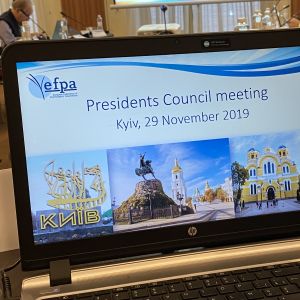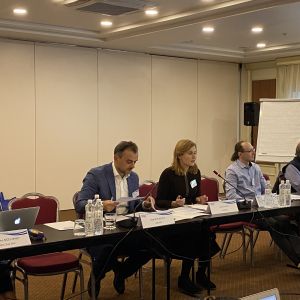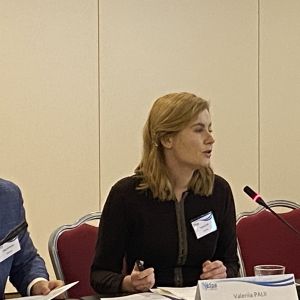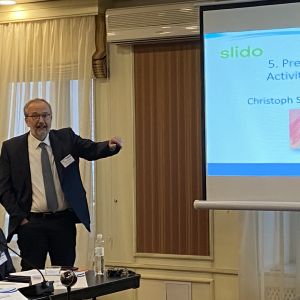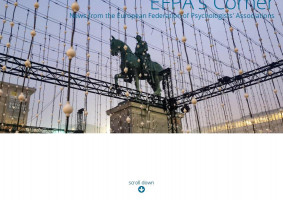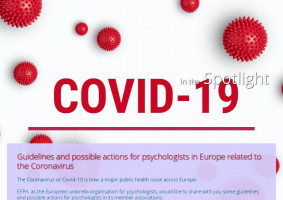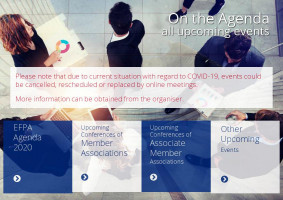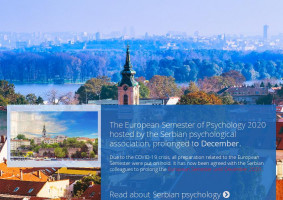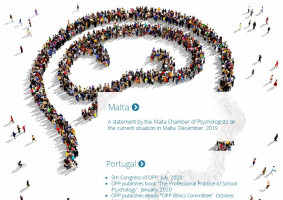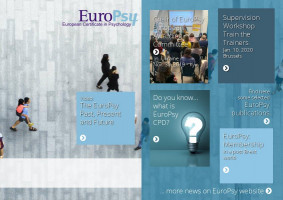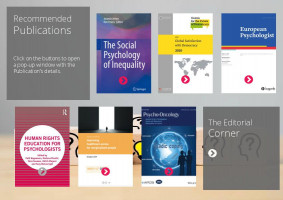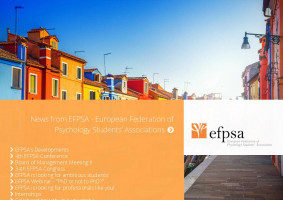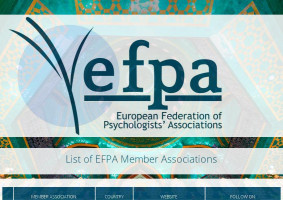(1)_w648_h434_1.jpg)
Welcome to the EFPA News Magazine, the magazine that was established for the exchange of all relevant news and information among our member associations.
In this edition, which we prepared before the COVID-19 crisis started, we were going to draw special attention to the partnership of EFPA with BPS in a post Brexit world, and present the EU-project RECOVER-E.
But now the news about coronavirus (COVID-19) dominates the headlines and public concern is on the rise. We have tried to update the news on the congresses, but although most of them have been cancelled or postponed to a later date, often the exact dates are not known yet.
As usual, you will find news from Members, from EuroPsy and the updated Agenda of meetings and events. We hope you enjoy reading this edition, and as EFPA President Steinebach expresses in his message we wish you strength in this difficult times!
The editorial board.
news@efpa.eu
_w332_h394_1.jpg)
Many conferences, congresses and meetings are cancelled or postponed. Most of our groups are not meeting on site now, but are planning online meetings. This pandemic has directly and profoundly changed our everyday life and our interaction. But it also offers the opportunity to make even greater use of digital media for our needs.
With our presence at various conferences and congresses, we wanted to strengthen cooperation with other disciplines. We wanted to illustrate an in-depth discussion on the contribution of psychology to solving major social challenges. These objectives remain, even if the dates and places may change. With flexible planning and a creative use of digital media, we will continue to pursue our goals even under the now really difficult conditions.
A good contact with other professional associations at European level is important, as well as an intensive exchange with our member associations. Only then will we be able to react to emergencies. The fact that the EFPA network also works in times of emergency was demonstrated after the earthquake in Albania in November. Here it was possible to provide active support of our Standing committee Disaster and Crisis by organizing Emergency trauma training in Tirana.
Initial meetings on the two EU projects "RECOVER-E" and "H-Work" show that the projects offer excellent opportunities to strengthen our presence in politics and society.
In addition, the European projects in which we are involved offer a good opportunity to bring in our expertise. As an example, in January there was the kick off meeting in Bologna for “H-Work”. In this EU project, led by University of Bologna and funded by Horizon 2020 about ‘Mental Health at workplaces’ EFPA is highly involved. And at the same time EFPA groups are working hard on a new concept of deliverables following the new strategic aims of EFPA for the following two years.
The past weeks show that high expectations are being placed on EFPA internally, but also from outside. To adapt to these expectations and to meet them is a great challenge in times of change and crisis. EFPA and its member associations – and it does not matter whether they are from an EU member state or not - are facing these challenges with the conviction that science and practice of human mind and behaviour can make an important contribution to securing a life in freedom and self-determination in a socially responsible manner. And this despite or perhaps because of coronvirus, climate change, mental illness, violence and much more.
Yours,
Christoph Steinebach, EFPA President
EFPA President Council meeting
November 29, 2019, Kyiv.
On the 29th of November, the EFPA Presidents Council Meeting was held in Kyiv, during the European Semester of Psychology in Ukraine. The meeting was the occasion to discuss the strategy for the next two years with a focus on the decisions made by the General Assembly in July 2019.
The German colleagues from BDP gave a presentation about the developments regarding Psychotherapy in Germany. Following their presentation, the developments were discussed and compared with other countries.
As usual, the meeting was also the occasion for the attending Presidents to exchange information about ongoing projects of their associations and to discuss common challenges. Lastly, a final report on ECP 2019 Moscow was presented, as well as a currents status of the organisation of ECP 2021 in Ljubljana.
Ukrainian members of the EFPA Standing Committee on Crisis, Disaster and Trauma Psychology provide assistance to Albanian colleagues after earthquake.
Tirana, January , 2020
In the morning of November 26, 2019, a massive earthquake struck Albania. An emergency headquarter of the Order of the Psychologists in Albania (OPA ) was immediately organized to receive real-time information and to provide first psychological aid based on this information. OPA requested the assistance of EFPA and other counterpart organizations to train psychologists who will continue to treat the trauma-affected population in medium and long terms.
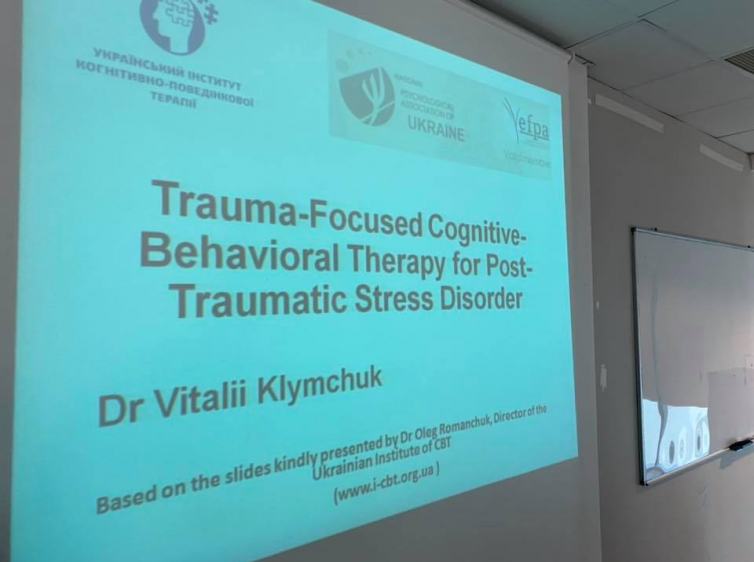
First psychological first aid
Early in the morning of November 26, 2019 a massive earthquake struck Albania. It was 3:50 a.m. when a 6.4 Richter scale magnitude earthquake shook everyone. 52 people were killed and hundreds of buildings were ruined. All state bodies were unprepared for this situation. Since the first day, given the sense of humanity and responsibility, the Order of the Psychologists in Albania (OPA) appeals to all its members to voluntarily disperse to earthquake-hit areas and provide first psychological aid. An emergency headquarter of OPA, led by the President of OPA Dr. Valbona Treska was immediately organized to receive real-time information and to provide first psychological aid based on this information.
350 psychologists responded to the public call and were perfectly organized to cover around 53 emergency areas. While the state administration still lacked accurate data on the aftermath of the tragedy, OPA built a network that broadcast in real time the needs of each center where the earthquake-affected people were gathered. For five days in a row, the Order of the Psychologists was the only institution that transmitted to the government bodies the actual updated data, needed to manage the situation. It is evident that the first intervention was only to provide psychological first aid in basic conditions and there was an urgent need to structure how to proceed with the provision of appropriate assistance.
EFPA member associations assist with training
Understanding the importance of the situation, OPA requested the assistance of EFPA and other counterpart organizations to train psychologists who will continue to treat the trauma-affected population in medium and long terms. The first organizations that offered assistance were Ukraine, followed by Portugal, Turkey and Italy.
Ukraine has well-developed workforce in fields of trauma therapy, dealing with psychosocial issues of war veterans, IDPs and conflict-affected population. Therefore, support from National Psychological Association of Ukraine to Albanian Order of Psychologists was offered and accepted.
Dr. Vitalii Klymchuk, vice-president of NPA, made a field trip to Tirana to support colleagues with capacity-building activities. In four days (14-17 January 2020) 3 workshops were conducted.
_w754_h444_1.jpg)
Workshops
General aim was to support psychologists and other relevant professionals in building capacities for providing MHPSS for trauma survivors. Such objectives were agreed:
To increase capacities of psychologists in delivering evidence-based psychosocial interventions to trauma- and crisis-affected population
To support the development of a sustainable system of MHPSS reactions on traumas, crisis and disasters.
To establish ongoing cooperation and sharing experience between Albania and Ukraine in the field of trauma and crisis psychology.
The workshop “How can we build better MHPSS system for emergencies?” took place on 14 January 2020, at the head office of the Order of Psychologists of Albania. The multi-stakeholders meeting was attended by representatives of different NGO-s, as: “Save the Children”, “World Vision”, “Sate Agency for the Rights and Protection of Children”, “Different and Equal”, “Terre des Hommes”, “Hello! Friend”, “ABC Clinic”, “Women Forum Elbasan”, “Women-Peace-Security”, “National Line Against Violence to Women”, etc.
Together we tried to achieve common understanding of the current situation, gaps and resources to be utilized. Participants received the overview of MHPSS Emergency response pyramid and Inter-Agency Standing Committee guidelines, WHO evidence-based psychosocial scalable interventions (MH GAP Intervention Guide, Problem Management Plus etc.) as well as other evidence-based interventions for trauma (TF CBT, EMDR etc.)
Finally, we had a part dedicated to looking for solutions. For this aim we used Complexity Management Tools, tried to develop “Best” and “Worst” scenario and look at the steps that can lead to success or to failure. Each group outlined at the end that joining resources, coordination of activities, workforce development and funding reservation are the most relevant directions for the future steps.
The workshop “Introduction to the Trauma-Focused Cognitive Therapy for Post-Traumatic Stress Disorder” took place on 15-16 January 2020, in the Mediterranean University. 140 psychologists attended the workshop and improved knowledge in trauma consequences, PTSD assessment and treatment pf adults.
The last one workshop was conducted for psychologists who work with children and adolescents “Introduction to the group CBT based intervention for the children: Teaching Recovery Technics (TRT, UK) and Support for Students Exposed to Trauma (SSET, USA)” (17 January 2020).
Participants of these capacity-building activities were eager to learn and receive evidence-based and scientific knowledge, as well to share their experience of dealing with earthquake consequences. We believe that systematic education in crisis and disaster psychology is what we need to think further and not just for the one country, but for the all of the countries all over the world.
Dr. Vitalii Klymchuk
Dr. Velbona Tresk
_w396_h260_1.jpg)
Read the letter from EFPA to BPS and their reply to EFPA in the next section in this magazine, 'In the Spotlight'
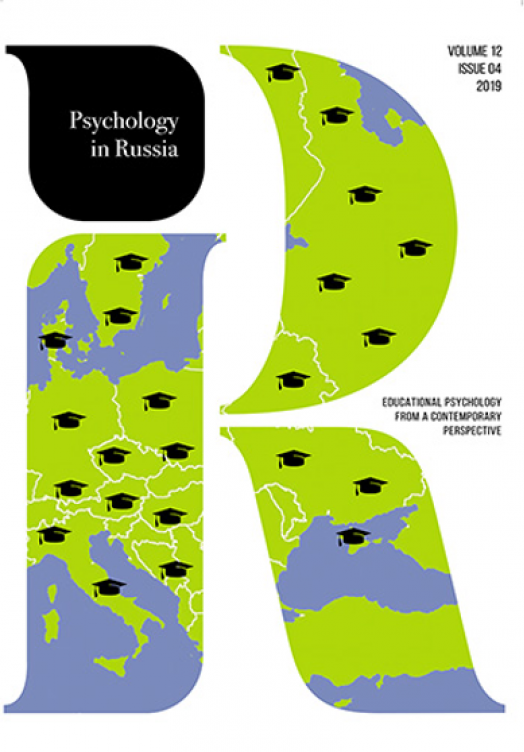
Psychology in Russia
The special issue of The Russian Psychological Society journal on Psychology and Education includes a contribution of the EFPA’s Standing Committee on Psychology in Education.
In the summer 2019 the Russian Psychological Society was the host to the 16th European Congress of Psychology (ECP) in Moscow, gathering psychologists from all over the world. In connection with the 2019 ECP, this special edition has been compiled by members of EFPA’s Standing Committee on Psychology in Education (SCPiE) and represents a collection of papers highlighting the range of work that educational psychologists undertake with schools and youth. Tis volume is also the next step for the EFPA Standing Committee for Psychologists in Education to strengthen and promote educational psychology in Europe, in order to reach our end goal: efcient and wellfunctioning institutions of learning.
75 Years Liberation of Auschwitz:
Auschwitz ‘Never Again’
‘The Eleventh Commandment: thou shalt not be indifferent.’
Roman Kent, President of the International Auschwitz Committee
'Men are accomplices to that which leaves them indifferent.'
George Steiner (1929-2020)
'The highest sin is indifference, thoughtlessness.'
Hannah Arendt (1906-1975).
Auschwitz ‘Never Again’
The 75th anniversary of the liberation of Auschwitz, gives us the opportunity to reflect on the history and meaning of Auschwitz today.
This year, 2020, we remember one of the worst episodes of human rights violations in history: the dehumanisation, deportation and killing of millions of people, including Jews, Roma / Sinti, gay people and resistance fighters.
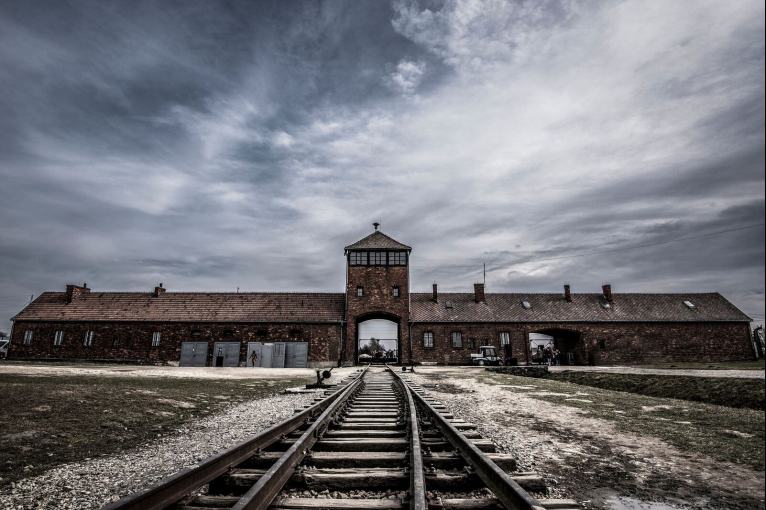
We should also remember at this time the many people with mental health and other disabilities who were murdered as part of the Nazi euthanasia programme, and the involvement of professionals including doctors and nurses and that psychological ideas about eugenics played a significant role in its justification. [1]
The psychological consequences, in the form of massive traumata, are still felt in today generations of victims and survivors. The newsletter of the EFPA BHR&Psy will give extra attention to people who are being forcefully displaced, dehumanised, tortured or killed. Also, the profession of psychology can draw ethical lessons from the professional involvement of doctors in the so-called T-4 programme. By their knowledge and skills, psychologists can and should contribute to a more peaceful and humane society, to trauma treatment and prevention of exclusion and disasters. A human rights based-and-oriented psychology is more than ever needed.
[1] Film: Cizik School of Nursing “Caring Corrupted”
Books: Benedict, S. (2014). Nurses and midwives in Nazi Germany: the "euthanasia programs". New York: Routledge.
Lifton, R. J. (1986). The Nazi Doctors: Medical killing and the psychology of genocide. London, UK: Macmillan.
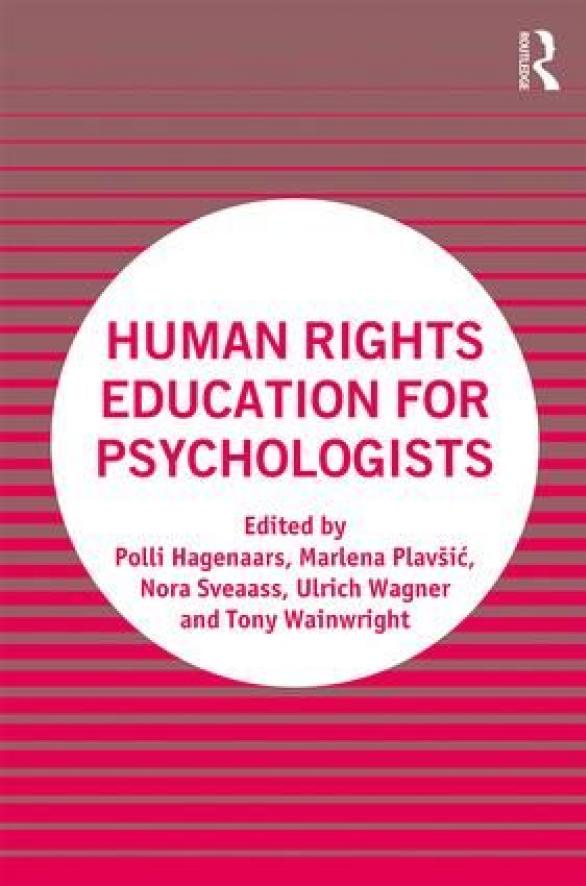
EFPA Board Human Rights and Psychology presents:
Textbook Human Rights Education
for Psychologists
The EFPA Board Human Rights and Psychology has been working on how to support psychologists in understanding more about the connection between our discipline and human rights, in both theoretical terms and in everyday practice.
Following a very successful expert meeting held in Venice in 2016, a textbook Human rights education for psychologists will be published in April. The next issue of the news magazine will have a full feature article and information.
_w702_h360_1.jpg)
Follow us on

_w300_h300_1.png)
